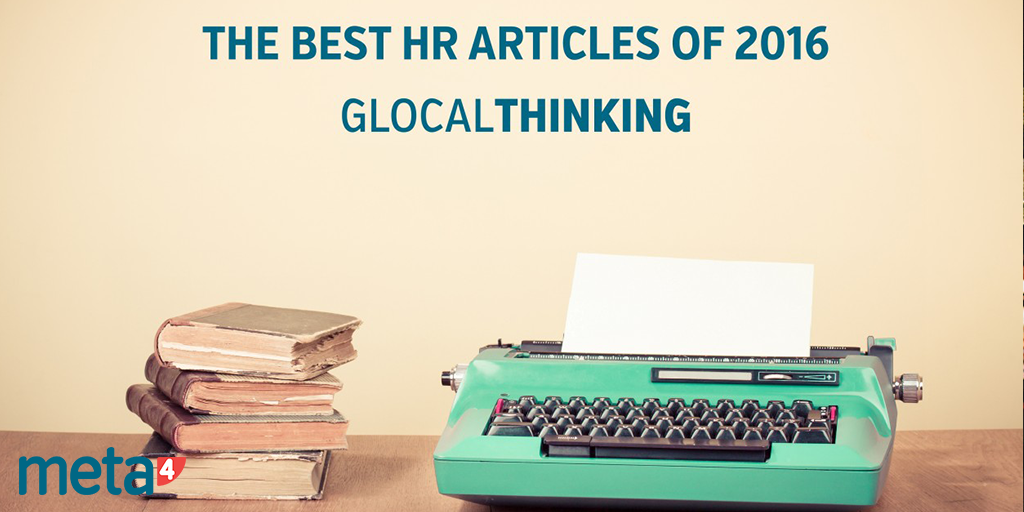Discover here the must-read HR articles of 2016!
This Is A Great Time To Be In HR
By Dave Ulrich in LinkeIn
We see four forces making HR more central to business success: the context of business (STEPED: social, technological, economic, political, environmental, and demographic changes), the increased pace of change (VUCA: volatility, uncertainty, complexity, ambiguity), the demise of employee well being (individuation, isolation, indifference, intensity), and the requirement to be outside in (attend to customers, investors, and communities). Collectively, these four forces shift HR to centerstage. In our book Victory Through Organization, our first sentence is “HR is not about HR” but attending to these four forces to deliver business value.
A Framework For How Any Company Can Design Amazing Employee Experiences
By Jacob Morgan in @Forbes
Over the past few months I’ve been working on a series of articles all around the employee experience which I define as being a combination of three distinct environments (physical, cultural, and technological). I’ve been interviewing and speaking with many of the world’s top talent executives to learn how they think about and design experiences for their employees (some of these people include Pat Wadors the CHRO of Linkedin, Francine Katsoudas the Chief People Officer at Cisco, Kristen Robinson the Chief HR Officer at Pandora, Ellyn Shook the Chief HR Officer at Accenture, David Rodriguez the Chief HR Officer at Marriott International, Mark Levy the Global Head of Employee Experience at Airbnb, Regis Mulot the EVP of HR at Staple, and many others, you can listen to some of the conversations on my podcast here…
By Sigal Barsade and Olivia A. O’Neill in @HarvardBiz
Before leaving work each day, employees at Ubiquity Retirement + Savings press a button in the lobby. They’re not punching out—not in the traditional sense, anyway. They’re actually registering their emotions. They have five buttons to choose from: a smiley face if they felt happy at work that day, a frowny face if they felt sad, and so on. This may sound like an HR gimmick (“See? Management cares how you feel!”) or an instrument of forced satisfaction (“The team with the most smiley faces wins!”). But it’s neither. Ubiquity is using the data it collects to understand what motivates employees—to learn what makes them feel a sense of belonging and excitement at work. Other organizations are starting to do the same. Some use apps that record how much fun people are having. Some hire technology consultants who specialize in the monthly, weekly, daily, or even hourly tracking of moods. Unfortunately, though, these organizations are in the minority. Most companies pay little attention to how employees are—or should be—feeling. They don’t realize how central emotions are to building the right culture…
Understanding The Power Of Expectations
By Tanveer Naseer in his blog
A few weeks ago, my oldest daughter and I were watching one of our favorite dramas when a scene came along that spurred on a conversation about leadership and the expectations we have about those we work for. The scene in question revolved around one of the main characters who in his new job as a sous-chef had spent the past few days cutting over 40 pounds of potatoes into paper-thin slices. When the head chef – the main character’s boss – walks into the kitchen, the sous-chef points to the heaping bowl of potato slices on his station and tells the head chef he’s completed his task…
Top 10 reasons why your organisation needs to shift to a data-driven HR model
By DrJohnSullivan in HRZone
Improving HR’s business impact must be a priority for future-thinking, strategic HR professionals. This article looks at one key aspect of impact: the importance of having a data-driven model. If you’d like to delve deeper into this topic and understand at a broader level how to improve HR’s business impact, download our whitepaper – Make HR #1 for Business Impact – now. If you haven’t made the shift to data-driven decision making in HR, then you are hurting your firm’s growth and you’re definitely not an HR business leader. You can easily prove how many in HR have already made the shift by looking on Twitter and finding #HRAnalytics or #PeopleAnalytics which receive daily use. There are also over one million blogs that have discussed this topic in one form or another…
Purpose Or Engagement? Is One Better Than The Other?
By MEGHAN M. BIRO in @TalentCulture
When you ask HR executives what it takes to succeed, many will stress the importance of employee engagement. They refer to a company’s need for employees who are excited about their work, who are motivated to do well, and whose goals are in sync with the objectives of the organization. Employee engagement relates to employee happiness, job satisfaction, and much more.
How Artificial Intelligence Will Redefine Management
By Vegard Kolbjørnsrud, Richard Amico and Robert J. Thomas in @HarvardBiz
Many alarms have sounded on the potential for artificial intelligence (AI) technologies to upend the workforce, especially for easy-to-automate jobs. But managers at all levels will have to adapt to the world of smart machines. The fact is, artificial intelligence will soon be able to do the administrative tasks that consume much of managers’ time faster, better, and at a lower cost. How can managers — from the front lines to the C-suite — thrive in the age of AI? To find out, we surveyed 1,770 managers from 14 countries and interviewed 37 executives in charge of digital transformation at their organizations. Using this data, we identified five practices that successful managers will need to master.






